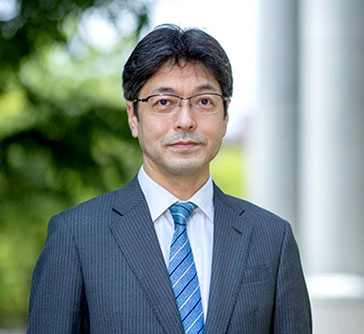Cutaneous Immunology
TEL +81-6-6879-3030
Overview
Pathology of intractable skin diseases and new diagnostics and treatments
Study of skin homeostasis for new clinical treatments.
I. Research on the mechanism of skin homeostasis
1.Molecular factors that regulate skin cells
2.Function of perspiration
3.Molecular mechanism of skin response to ultraviolet light
II. Research on skin allergies and autoimmune diseases
Many skin diseases, such as atopic dermatitis, drug allergies, and occupational skin diseases, are widespread in societies. Solving the pathology of these autoimmune diseases is key for new treatments.
1. Comprehensive study of atopic dermatitis
1) Skin immunity and barrier function
2) Nerve regeneration and temperature sensors and their relation with itching sensations
3) Immune responses mediated by IgE antibody
4) Epidemiological study of allergic diseases
5) Development of novel therapeutic drugs for atopic dermatitis
2. Immune responses of skin to drugs and chemical substances
1) Pathology and control of contact dermatitis
2) Pathogenesis of urticaria
3) Diagnostics for drug allergies
III. Pathogenesis of hereditary skin diseases and dyschromia and development of new therapies
1. Regenerative medicine and drug discovery for pigmentary abnormalities such as vitiligo
2. Therapies that target mTOR signaling for tuberous sclerosis, neurofibroma, Fabry disease
IV. Diseases of the collagen, vascular and connective systems
1. Research on scleroderma
1) Development of treatments for skin hardening, Raynaud’s disease, skin ulcers
2) Crosstalk of connective tissuematrix
3) Research on molecular mechanisms related to wound healing
2. Modeling annular erythema formation in Sjogren’s syndrome
Clinical analysis of annular erythema
3. Studies on antiphospholipid antibody syndrome, ulcers, circulatory disorders
1) Ulcers and circulatory disorders
2) Antiphospholipid antibody syndrome
V. Research on skin malignancies
- Establishment and validation of novel therapeutic strategies including immunity checkpoint inhibitors, HVJ-E (Sendai virus envelope) vectors, WT-1 peptide therapies, etc.
- Study of the pathology and treatment of cutaneous lymphoma
VI. New diagnostic and treatment strategies for psoriasis to improve quality of life
Diagnostic imaging for psoriatic arthritis
Principal Investigator
Manabu Fujimoto Professor

Research field
Cutaneous Immunology
Education history
| 1992.3 | MD, the University of Tokyo, Japan |
|---|---|
| 2001.5 | PhD, the University of Tokyo, Japan |
Research and career history
| 1996.12 | Assistant, Dermatology, the University of Tokyo Hospital |
|---|---|
| 1997.6 | Research Fellow, Duke University Medical Center, USA |
| 2000.10 | Group Leader, National Center for Global Health and Medicine, Japan |
| 2004.10 | Lecturer, the University of Tokyo Hospital |
| 2005.3 | Associate Professor, Dermatology, Graduate School of Medicine, Kanazawa University |
| 2013.11 | Professor, Dermatology, Graduate School of Medicine, Tsukuba University |
| 2019.2 | Professor, Dermatology, Graduate School of Medicine, Osaka University |
Prize
| 2009 | Rhoto Dermatology Investigator Award |
|---|---|
| 2013 | JSID Award |
| 2015 | Rising Star Award (Pola Pharma/Japanese Dermatology Association) |
Members
- Manabu Fujimoto Professor
fujimotoderma.med.osaka-u.ac.jp
Achievements
Publications
- Matsushita T, Kobayashi T, Mizumaki K, Kano M, Sawada T, Tennichi M, Hamaguchi Y, Iwakura Y, Hasegawa M, Fujimoto M, Takehara K. BAFF inhibition attenuates fibrosis in scleroderma by modulating the regulatory and effector B cell balance. Sci Adv. 2018;4:eaas9944.
- Matsushita T, Le Huu D, Kobayashi T, Hamaguchi Y, Hasegawa M, Naka K, Hirao A, Muramatsu M, Takehara K, Fujimoto M. A novel splenic B1 regulatory cell subset suppresses an allergic disease via PI3K-Akt pathway activation. J Allergy Clin Immuol. 2016;138:1170-1182.
- Le Huu D, Matsushita T, Jin G, Hamaguchi Y, Hasegawa M, Takehara K, Tedder TF, Fujimoto M. Donor-derived regulatory B cells are important for suppression of murine sclerodermatous chronic graft-versus-host disease. Blood. 2013;121:3274-83.
- Jin G, Hamaguchi Y, Matsushita T, Hasegawa M, Huu DL, Ishiura N, Naka K, Hirao A, Takehara K, Fujimoto M. BLNK expression contributes to controlling allergic and autoimmune diseases by mediating IL-10 production in regulatory B cells. J Allergy Clin Immunol. 2013;131:1674-1682
- Fujimoto M, Hamaguchi Y, Kaji K, Matsushita T, Ichimura Y, Kodera M, Ishiguro N, Ueda-Hayakawa I, Asano Y, Ogawa F, Fujikawa K, Miyagi T, Mabuchi E, Hirose K, Akimoto N, Hatta N, Tsutsui K, Higashi A, Igarashi A, Seishima M, Hasegawa M, Takehara K. Myositis-specific anti-155/140 autoantibodies target transcriptional intermediary factor family proteins. Arthritis Rheum. 2012;64:513-522.
- Matsushita T, Yanaba K, Bouaziz J-D, Fujimoto M, Tedder TF. Regulatory B cells inhibit EAE initiation while other B cells promote disease progression. J Clin Invest. 2008;118:3420-30
- Yanaba K, Bouaziz J-D, Hass KM, Poe JC, Fujimoto M, Tedder TF. A regulatory B cell subset with a unique CD1dhighCD5+ phenotype controls T cell-dependent inflammatory responses. Immunity. 2008;28:639-650.
- Poe JC, Fujimoto Y, Hasegawa M, Hass KM, Sanford I, Bock CB, Fujimoto M, Tedder TF. CD22 regulates B lymphocyte function in vivo through both ligand-dependent and -independent mechanisms. Nat Immunol. 2004;5:1078-1087
- Saito E, Fujimoto M, Hasegawa M, Komura K, Hamaguchi Y, Kaburagi Y, Nagaoka T, Takehara K, Tedder TF, Sato S. CD19-dependent B lymphocyte signaling thresholds influence skin fibrosis and autoimmunity in the Tight Skin mice. J Clin Invest. 2002;109:1453-1462.
- Fujimoto M, Fujimoto Y, Poe JC, Jansen PJ, Lowell CA, DeFranco AL, Tedder TF. CD19 regulates Src-family protein tyrosine kinase activation in B lymphocytes through processive amplification. Immunity. 2000; 13:47-57.
- Fujimoto M, Bradney A, Poe JC, Steeber DA, Tedder TF. Modulation of B lymphocyte antigen receptor signal transduction by a CD19/CD22 regulatory loop. Immunity. 1999;11:191-200.
